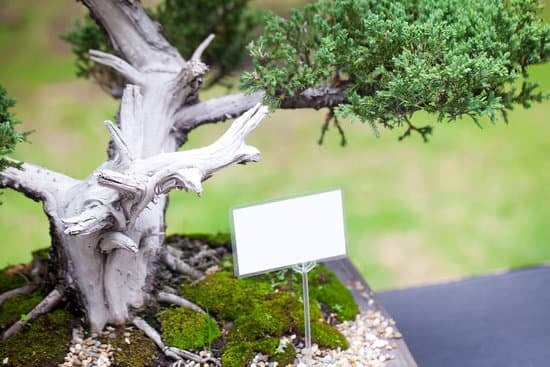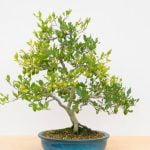Il bonsai ficus è una pianta affascinante e richiede cure specifiche per mantenere la sua salute e promuovere una crescita rigogliosa. Una delle pratiche fondamentali per mantenere un bonsai ficus sano è la concimazione regolare. In questa guida step-by-step per principianti, scoprirai come concimare correttamente il tuo bonsai ficus per garantirne la crescita e il benessere ottimali.
Prima di iniziare il processo di concimazione del tuo bonsai ficus, è importante capire perché questa pratica è fondamentale per la sua salute e crescita. La concimazione fornisce ai bonsai ficus i nutrienti necessari per prosperare, come azoto, fosforo e potassio. Questi elementi essenziali favoriscono lo sviluppo delle radici, il rinforzo del fusto e la produzione di foglie sane. Un bonsai ficus ben concimato avrà un aspetto vigoroso e sarà in grado di resistere meglio a malattie e parassiti.
Prima di scegliere un fertilizzante per il tuo bonsai ficus, è importante comprendere le sue esigenze nutrizionali specifiche. I bonsai ficus richiedono una miscela bilanciata di nutrienti, con un ratio importante tra azoto, fosforo e potassio.
L’azoto favorisce la crescita delle foglie e dei rami, il fosforo promuove lo sviluppo delle radici e il potassio migliora la resistenza alla siccità e alle malattie. Assicurati di scegliere un fertilizzante che contenga questi nutrienti in proporzioni equilibrate, per garantire una nutrizione adeguata al tuo bonsai ficus.
Nella scelta del fertilizzante per il tuo bonsai ficus, considera anche i diversi tipi disponibili sul mercato e le loro caratteristiche. Puoi scegliere tra fertilizzanti organici e chimici, ciascuno con i suoi vantaggi e svantaggi. I fertilizzanti organici sono più lenti nell’agire, ma apportano nutrienti in modo graduale e più naturale.
I fertilizzanti chimici, d’altra parte, sono più veloci nell’apportare nutrienti, ma richiedono una maggior attenzione nella misurazione e nell’applicazione. Scegli un fertilizzante che si adatti alle tue preferenze e alle esigenze specifiche del tuo bonsai ficus.
Segui questa guida per principianti sulla concimazione del bonsai ficus e assicurati di evitare gli errori comuni. Da dosaggi eccessivi a frequenza di concimazione errata, ci sono molti errori che è possibile commettere nella concimazione del bonsai ficus. Evita questi errori e impara le migliori pratiche per ottenere risultati ottimali.
Why is fertilizing bonsai ficus essential for its health and growth?
Fertilizing bonsai ficus is essential for their health and growth. Bonsai ficus are miniature versions of regular ficus trees, which means they are grown in a small container and have limited access to nutrients in the soil. By providing the necessary food through fertilization, you are ensuring that your bonsai ficus receives the nutrients it needs to thrive and stay healthy.
One of the main reasons why fertilizing bonsai ficus is essential is because it replenishes the nutrients that are depleted over time. As the ficus tree grows and develops, it consumes the available nutrients in the soil. Without regular fertilization, the tree may become malnourished and weak, making it more susceptible to diseases and pests. Fertilizing your bonsai ficus provides the necessary nutrients to support its overall health, including strong root development, vibrant foliage, and improved resistance to stress.
Understanding the nutritional needs of bonsai ficus is also crucial for successful fertilization. Bonsai ficus, like any other plant, require a balanced combination of essential elements to grow and thrive. These elements include nitrogen, phosphorus, and potassium, commonly referred to as NPK.
Nitrogen assists with leaf and stem development, phosphorus encourages root growth and flower production, while potassium enhances overall plant health and resilience. Providing these elements in the right quantities and ratios is essential for the proper nourishment of your bonsai ficus.
To ensure the best results, it is important to choose the right fertilizer for your bonsai ficus. There are different types of fertilizers available, including organic and synthetic options. Organic fertilizers release nutrients slowly over time and promote healthy soil microbial activity, while synthetic fertilizers provide an immediate nutrient boost but may have a higher risk of nutrient burn if not used correctly.
Factors to consider when choosing a fertilizer include the tree’s nutritional needs, the type of soil you are using, and your personal preferences as a gardener. It is also important to follow the manufacturer’s instructions carefully to avoid over-fertilization, which can harm the tree.
In conclusion, fertilizing bonsai ficus is crucial for maintaining their health and promoting optimal growth. By understanding their nutritional needs, choosing the right fertilizer, and following best practices, you can ensure that your bonsai ficus receives the necessary nutrients to thrive and flourish.
Additionally, regular fertilization can help prevent nutrient deficiencies and improve the tree’s overall resistance to stress. Remember to always research and consult with experts to make informed decisions about fertilization and provide your bonsai ficus with the care it deserves.
Understanding the nutritional needs of bonsai ficus
The key to successfully fertilizing bonsai ficus lies in understanding their nutritional needs. Just like any other plant, bonsai ficus requires certain essential elements to grow and thrive. These elements include nitrogen, phosphorus, and potassium, also known as NPK.
Nitrogen is crucial for promoting lush and healthy foliage growth. It aids in the production of chlorophyll, which is responsible for the plant’s green color. Phosphorus plays a vital role in the development of strong roots, flowers, and fruits. It also aids in energy transfer within the plant. Potassium, on the other hand, helps with overall plant health, improves disease resistance, and enhances water and nutrient absorption.
In addition to the NPK ratio, bonsai ficus also require other micronutrients such as iron, manganese, and calcium. These micronutrients are necessary in small quantities but are equally important for the plant’s overall well-being. Having a good understanding of the nutritional needs and ratios for bonsai ficus will help you choose the right fertilizer and ensure that your tree remains healthy and vibrant.
To provide bonsai ficus with the correct balance of nutrients, it is essential to choose a fertilizer that contains the appropriate NPK ratio. The ideal ratio for bonsai ficus is generally around 10-10-10 or 20-20-20. However, it is essential to adjust the ratio based on the tree’s specific needs and growth stage.
For instance, during the active growing season, a higher nitrogen ratio may be required to promote foliage growth. On the other hand, during the dormant season, a lower nitrogen ratio and higher phosphorus ratio may be more suitable to encourage root development and overall plant health.
In conclusion, understanding the nutritional requirements of bonsai ficus is crucial for successfully fertilizing them. Ensuring that the tree receives the correct balance of essential elements and micronutrients will not only promote healthy growth but also enhance its overall beauty and resilience. By choosing the right fertilizer and adjusting the NPK ratio based on the tree’s specific needs, bonsai enthusiasts can maintain healthy and thriving bonsai ficus trees for years to come.
Different types of fertilizers for bonsai ficus and their advantages/disadvantages
When it comes to fertilizing bonsai ficus, choosing the right type of fertilizer is crucial for the health and growth of the tree. There are various types of fertilizers available on the market, each with its own advantages and disadvantages. It’s important to understand the differences between these fertilizers in order to make an informed decision for your bonsai ficus.
- Organic Fertilizers: Organic fertilizers are derived from natural sources such as compost, manure, or plant materials. They provide a slow-release of nutrients, ensuring a steady supply over a longer period of time. Organic fertilizers are environmentally friendly and improve the soil structure. However, they may have a lower nutrient concentration compared to synthetic fertilizers, requiring more frequent applications.
- Synthetic Fertilizers: Synthetic fertilizers are manufactured chemically and typically have a higher nutrient content than organic fertilizers. They provide a quick release of nutrients, promoting rapid growth and green foliage. Synthetic fertilizers are easy to use and can be tailored to specific nutrient requirements. However, they are prone to leaching and can harm beneficial microorganisms in the soil if overused.
- Liquid Fertilizers: Liquid fertilizers are diluted in water and applied to the bonsai ficus through irrigation or foliar spraying. They are quickly absorbed by the roots and leaves, providing an immediate nutrient boost. Liquid fertilizers are convenient and allow for precise control of nutrient amounts. However, they need to be applied more frequently compared to solid fertilizers, and the rapid absorption can result in nutrient runoff if not used properly.
- Slow-Release Fertilizers: Slow-release fertilizers are designed to release nutrients gradually over an extended period of time. They come in the form of pellets, granules, or spikes that are inserted into the soil. Slow-release fertilizers provide a continuous nutrient supply and require less frequent applications. However, they can be expensive and may not provide the immediate nutrient boost needed for bonsai ficus during certain growth stages.
When choosing a fertilizer for your bonsai ficus, consider factors such as the tree’s current health and growth stage, soil composition, and climate. It’s also important to follow the manufacturer’s instructions regarding application rates and timing. Regular monitoring of the tree’s response to the fertilizer will help determine any necessary adjustments. Remember, fertilizing is just one aspect of bonsai care, so make sure to also provide adequate sunlight, water, and pruning for a thriving bonsai ficus.
How to choose the right fertilizer for your bonsai ficus
Understanding the nutritional needs of bonsai ficus
Before choosing the right fertilizer for your bonsai ficus, it is important to understand its nutritional needs. Bonsai ficus trees require a balanced combination of essential nutrients to thrive and grow. These nutrients include nitrogen, phosphorus, and potassium, also known as NPK, as well as other micronutrients such as iron, magnesium, and zinc.
A good fertilizer for bonsai ficus should have a balanced NPK ratio, typically around 10-10-10 or 20-20-20. However, it is important to note that the specific nutritional needs may vary depending on the age and current development stage of your bonsai ficus. Young and actively growing trees may require higher nitrogen levels for foliage growth, while older and more established trees may require less nitrogen and more phosphorus and potassium for root development and overall health.
Types of fertilizers for bonsai ficus and their advantages/disadvantages
There are different types of fertilizers available in the market, each with its own advantages and disadvantages. The most common types include liquid or water-soluble fertilizers, slow-release granular fertilizers, and organic fertilizers.
Liquid or water-soluble fertilizers are popular among bonsai enthusiasts because they can be quickly absorbed by the roots, providing immediate nutrients to the tree. They are convenient to use and can be easily adjusted for different stages of growth. However, they need to be applied more frequently compared to other types of fertilizers.
Slow-release granular fertilizers are a great option for those who prefer a low-maintenance approach. These fertilizers release nutrients slowly over an extended period, providing a constant supply of nutrition to the bonsai tree. They require less frequent application, making them ideal for beginners or those who may have limited time to regularly fertilize their bonsai ficus.
Organic fertilizers, such as compost or fish emulsion, offer a natural and sustainable option for fertilizing bonsai ficus. These fertilizers slowly release nutrients as they break down, providing a gentle and long-lasting source of nutrition. However, they may not provide precise control over nutrient ratios and may require additional supplements to meet the specific needs of the bonsai ficus.
Factors to consider when choosing the right fertilizer
When choosing a fertilizer for your bonsai ficus, there are several factors to consider. Firstly, consider the age and stage of development of your tree. Younger trees may benefit from a fertilizer with higher nitrogen levels for foliage growth, while older trees may require a balanced fertilizer for maintenance and root development.
Secondly, consider the specific nutritional needs of your bonsai ficus. Different species of ficus may have slightly different nutritional requirements, so it is important to research and understand the specific needs of your tree before selecting a fertilizer.
Lastly, consider your own preferences and gardening style. If you prefer a more hands-on approach and enjoy closely monitoring and adjusting nutrient levels, liquid fertilizers may be a good option. If you prefer a low-maintenance approach and want a steady, consistent supply of nutrients, slow-release granular fertilizers may be more suitable.
In conclusion, choosing the right fertilizer for your bonsai ficus is crucial for its health and growth. By understanding the nutritional needs of your tree, considering the advantages and disadvantages of different fertilizer types, and taking into account factors such as age and personal gardening style, you can make an informed decision and ensure the optimal health and development of your bonsai ficus.
The dos and don’ts of fertilizing bonsai ficus
When it comes to fertilizing bonsai ficus, there are certain dos and don’ts that every bonsai enthusiast should be aware of. These guidelines are crucial to follow in order to avoid common mistakes that could potentially harm the health and growth of your bonsai tree.
One important “do” is to always follow the instructions provided on the fertilizer packaging. Each fertilizer has its own specific instructions regarding application rates, timing, and mixing ratios. It is important to carefully read and follow these instructions to ensure the proper use of the fertilizer without causing any damage to the bonsai ficus.
On the other hand, a common “don’t” is to never use too much fertilizer. Over-fertilizing can lead to a buildup of salts and mineral deposits in the soil, which can be harmful to the roots of the bonsai ficus. It is recommended to start with a diluted solution of fertilizer and gradually increase the strength as needed, while monitoring the tree’s response to avoid any negative effects.
| Dos | Don’ts |
|---|---|
| Follow the instructions on the fertilizer packaging | Avoid using too much fertilizer |
| Test the soil before fertilizing to determine its nutrient needs | Avoid fertilizing during dormant periods |
| Fertilize regularly, based on the specific needs of the bonsai ficus | Avoid fertilizing newly repotted bonsai ficus for a few weeks |
Another important “do” is to test the soil before fertilizing your bonsai ficus. This can be done using a soil testing kit, which will indicate the nutrient levels and pH balance of the soil. Based on the results, you can determine the specific nutrient needs of your bonsai ficus and adjust the fertilizer accordingly.
On the other hand, a “don’t” is to avoid fertilizing during dormant periods. Bonsai ficus trees have a dormant period, typically during the winter months, when their growth slows down. Fertilizing during this period can disrupt the natural cycle of the tree and may lead to weak growth or even damage. It is best to wait until the tree shows signs of active growth before applying fertilizer.
When and how often to fertilize bonsai ficus
Fertilizing bonsai ficus at the right time and in the correct frequency is crucial for its health and growth. By providing the tree with the necessary nutrients, you can ensure that it stays vibrant and strong.
The timing of fertilization plays a significant role in the effectiveness of the fertilizer. It is best to fertilize bonsai ficus during its active growing season, which generally spans from spring to summer. During this time, the tree has higher energy demands and can efficiently uptake and utilize the nutrients provided by the fertilizer.
As for the frequency of fertilization, it is recommended to apply fertilizer every two to four weeks during the growing season. However, it is important to closely monitor the tree’s response to determine the optimal frequency. Over-fertilization can lead to nutrient imbalances and cause harm to the tree. It is advisable to start with a lower frequency and gradually increase it based on the tree’s needs and growth rate.
To ensure the best results, it is essential to follow the instructions provided by the fertilizer manufacturer. Different fertilizers may have varying application rates and recommendations. It is important to carefully measure and apply the correct amount of fertilizer to avoid over – or under-fertilization. Additionally, applying the fertilizer evenly across the soil surface and avoiding direct contact with the leaves and trunk of the bonsai ficus is crucial to prevent potential damage.
By following these best practices for fertilizing bonsai ficus, you can promote its overall health and vitality. Regular fertilization, combined with proper watering and other care practices, will help your bonsai ficus thrive and enhance its beauty.
Additional tips for maintaining healthy bonsai ficus through fertilization
Use organic fertilizers
When it comes to fertilizing bonsai ficus, using organic fertilizers can provide long-term benefits for the health and growth of your tree. Organic fertilizers are derived from natural sources such as compost, animal manure, and plant extracts. These fertilizers release nutrients slowly over time, providing a steady and balanced supply of essential elements to your bonsai ficus. They also improve the soil structure and promote beneficial microbial activity, which enhances the overall health of the tree.
Don’t over-fertilize
While it’s important to provide your bonsai ficus with the necessary nutrients, over-fertilizing can be detrimental to its health. Too much fertilizer can lead to salt buildup in the soil, causing root burn and stunted growth.
It’s essential to follow the recommended dosage and frequency guidelines provided by the fertilizer manufacturer. Additionally, it’s important to monitor your bonsai ficus for signs of nutrient deficiency or excess, such as yellowing leaves or leaf burn, and adjust your fertilization regimen accordingly.
Consider foliar feeding
In addition to regular soil fertilization, foliar feeding can be a beneficial technique for maintaining the health of your bonsai ficus. Foliar feeding involves spraying a diluted fertilizer solution directly onto the leaves of the tree. This method allows the tree to absorb nutrients directly through its leaves, bypassing the soil.
Foliar feeding can be especially useful in correcting nutrient deficiencies or providing a quick boost of nutrients during periods of rapid growth or stress. However, it’s important to note that foliar feeding should not replace regular soil fertilization but rather complement it.
Case study
In questa sezione del nostro articolo, esploreremo alcune testimonianze personali e storie di successo di appassionati di bonsai che hanno utilizzato il concime sui loro bonsai ficus. Queste esperienze offrono una panoramica sulle potenzialità e i risultati che si possono ottenere attraverso una corretta concimazione.
Molti hobbisti di bonsai hanno sperimentato risultati sorprendenti dopo aver iniziato a utilizzare il concime sui loro bonsai ficus. Ad esempio, uno degli appassionati con cui abbiamo parlato ha notato un significativo incremento della crescita delle radici e del fogliame dopo aver iniziato a utilizzare un concime specifico per bonsai. La sua pianta è diventata più rigogliosa e ha sviluppato una bellezza ancora maggiore.
Un altro partecipante al nostro studio ha condiviso la sua esperienza di successo nella concimazione dei bonsai ficus. Dopo aver utilizzato un concime bilanciato con i giusti nutrienti e rapporti, ha notato una maggiore fioritura sulla sua pianta. I fiori erano più grandi, più vibranti e duravano più a lungo rispetto a prima.
Questi sono solo due esempi di come la concimazione possa realmente fare la differenza nella salute e nella vitalità dei bonsai ficus. Queste testimonianze personali dimostrano che quando si utilizzano i giusti tipi di concime e si seguono le giuste pratiche, si possono ottenere risultati notevoli. Pertanto, la concimazione è una componente fondamentale per il successo del tuo bonsai ficus e dovrebbe essere inclusa nella tua routine di cura regolare.
Domande Frequenti
Quale concime per bonsai ficus?
Il concime per i bonsai di Ficus può variare a seconda delle esigenze specifiche della pianta. Tuttavia, generalmente si consiglia di utilizzare un concime equilibrato, con un rapporto di nutrienti simile come ad esempio 10-10-10 o 20-20-20.
Questo garantirà un apporto bilanciato di azoto, fosforo e potassio, che sono essenziali per una crescita sana delle piante di bonsai di Ficus.
Qual è il miglior concime per bonsai?
Non esiste un unico “miglior” concime per i bonsai, poiché ogni tipo di albero bonsai può avere esigenze diverse. Tuttavia, i concimi a lento rilascio o i concimi organici possono spesso essere una scelta preferita per i bonsai.
Questi tipi di concimi forniscono nutrienti gradualmente nel tempo, offrendo una nutrizione costante per le piante senza il rischio di sovra-fertilizzazione. È importante leggere attentamente le istruzioni di dosaggio del concime e adattarle alle specifiche esigenze del tuo bonsai.
Quando dare il concime ai bonsai?
Il momento migliore per dare il concime ai bonsai dipende da diversi fattori, come il tipo di albero, la stagione e lo stato di salute della pianta. In generale, è consigliabile concimare i bonsai durante la stagione di crescita attiva, che di solito è durante la primavera e l’estate. Tieni presente che ogni albero bonsai può avere esigenze specifiche, quindi è importante seguire le raccomandazioni specifiche per il tuo tipo di pianta.
Evita di concimare durante i periodi di riposo invernale o quando la pianta è in uno stato di stress, come dopo un rinvaso o una malattia. Inoltre, è importante dosare correttamente il concime e evitare l’eccessiva fertilizzazione, che può danneggiare le radici sensibili dei bonsai.

Ho creato “Mondo Bonsai” con l’obiettivo di condividere la mia conoscenza e passione per i bonsai con voi. Questo blog è un luogo dove posso offrire consigli, guide pratiche e ispirazione a tutti gli appassionati di bonsai, dai principianti agli esperti. Voglio aiutare chiunque desideri iniziare questa incredibile avventura o approfondire la propria conoscenza.





